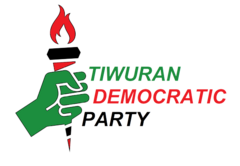Tiwuran Democratic Party
This article is incomplete because it is pending further input from participants, or it is a work-in-progress by one author. Please comment on this article's talk page to share your input, comments and questions. Note: To contribute to this article, you may need to seek help from the author(s) of this page. |
Tiwuran Democratic Party | |
|---|---|
 | |
| Chairman | Carl Ihekweme |
| Secretary | Akunna Ikpeazu |
| Founders | Nicholas Chukwudi Eriire Kolawole Enyinayya Akabueze Eze Mitchelson |
| Founded | November 1, 2002 Omamiri, Tiwura |
| Headquarters | 250 Remington Street Omamiri, Tiwura |
| Ideology | Big tent Economic liberalism Social conservatism Militarism |
| Political position | centre-right to right-wing |
| Colours | Green |
| Seats in Congress | 142 / 282
|
| Seats in the Senate | 45 / 120
|
The Tiwuran Democratic Party is a major political party in Tiwura, and has been one of Tiwura's two major political parties since 2009. It was founded in 2002 by Nicholas Chukwudi and several other political activists after then-president Mowiya Sekoni agreed to bring back democratic elections to Tiwura. The TDP would win in landslides in the 2003 Tiwuran general election and Chukwudi would become the first democratically elected leader of Tiwura since Derrick Clearmont. This was because the early party appealed to most demographics after Chukwudi and Kolawole would promise sweeping reforms after a half century of dictatorship. The party would be opposed by the United Movement of the People, a successor to the ideals of Sekoni and the Tiwuran Alliance of Peoples. By the end of the decade the TDP began to shift towards the interests of the Mwo and Sotirian majorities as well as pushing for economic liberalism and close relations with Estmere. This would result in the party's split in 2009, when Enyinayya Akabueze and several party leaders left to form their modern political rival the National Unity Party.
In 2018 Tiwuran Presidential Election, the TDP's Akunna Ikpeazu would lose to the NUP's Reginald Akinlabi.
History
In 2002, after years of protest and civil unrest within Tiwura, then-President Mowiya Sekoni agreed to hold elections and that he would not run for office. Prior to this announcement, the party's future founders were mostly political prisoners, activists, or military officers. The party's main founder, Nicholas Chukwudi, was a democrat and Mwo rights activist under Sekoni. Within a week of the announcement, Chukwudi met with Eriire Kolawole, a social democrat, Enyinayya Akabueze, a liberal, and Eze Mitchelson, a former military officer. The four would found the TDP and immediately saw massive support. The TDP's early platform was to democratize Tiwura and end the dictatorships. The TDP also immediately appealed to the Mwo population who had hated Sekoni's presidency. They also benefitted from the fact that their primary rivals, supporters of Sekoni, were heavily divided and the Social and Civil Liberation Rally would split with the rise of the United Movement of the People. In 2003, Chukwudi would win the election with 74% of the popular vote and the TDP achieved a significant majority within both the Senate and Congress.
With this majority, Kolawole, Chukwudi's Minister of Labor, claimed that "the people gave us a mandate to fix the mistakes of Tiwura's past". The TDP also gained large control of many states, and was unrivaled. TDP membership would begin to dip in with less support in the North and Midlands. This change led to a shift in the party during the 2007 Tiwuran Presidential Election. During the party's primaries several debates centered around who the party represents erupted. Chukwudi, despite being the favorite, was challenged heavily by the party's social democrats and minority leaders. There was also worry about the influence that Mitchelson had within the party, and how militarized Tiwura was becoming to defeat the rebellions in the west. Despite this, Chukwudi would come out as the party's nominee and subsequently win the election. However, the partys big-tent appeal began to fall apart as the issues raised in 2007 worsened over the next two years. Chukwudi and the conservatives within the party were accused of over-appealing to the Mwo population.
In 2009, Enyinayya Akabueze would split from the TDP to form the National Unity Party. Akabueze stated that the party was drifting towards the practices of Tiwura's old dictators, and that the people "needed a reasonable middle ground between TDP and UMP". This split would see the TDP lose millions of voters. In the next primaries, Chukwudi would not be able to run and so a new candidate was needed. What resulted was a heated debate over who should succeed him. There were four primary candidates. Aondowase Nenge, a moderate Sira politician who offered a way to appeal to lost supporters. Akunna Ikpeazu, a conservative who did not hide his support for former President Reese Okparro Ndulu. Jubilee Etienam, the party's first female candidate and offered a similar position to Ikpeazu. Lastly was Kadji Mbondi, a former military commander who played a key role in defeating the Magadi rebellion. Nenge won out the competititon and was as he offered a way to regain the lost voters. This strategy allowed the TDP to barely win in the election, with Nenge receiving 54.2% of the vote compared to the NUP's Akabueze who recieved 45.8%. Nenge's presidency would cause a great damage to the TDP's reputation. The Tiwuran economy took a downturn and many called for government intervention, but Nenge refused. The TAF also began to struggle in the western provinces with maintaining stability. The final blow came from the 2013 Delta Floods, which saw a devastating rainy season destroy the infrastructure of the delta and leave thousands homeless, resulting in riots. The party was unsure of what to do,